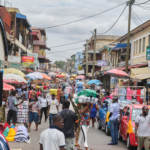
Closing out 2023, Ghana recorded a December inflation rate of 23.2%, according to data from the Ghana Statistical Service.
This figure reflects a 3.2 percentage point decrease from the November rate of 26.4% and the lowest rate in the year 2023.
!function(){“use strict”;window.addEventListener(“message”,(function(a){if(void 0!==a.data[“datawrapper-height”]){var e=document.querySelectorAll(“iframe”);for(var t in a.data[“datawrapper-height”])for(var r=0;r<e.length;r++)if(e[r].contentWindow===a.source){var i=a.data["datawrapper-height"][t]+"px";e[r].style.height=i}}}))}();
Despite this positive month-over-month change in the last five months, the average inflation rate for the entire year stands at 40.27%, signifying an 8.81% increase compared to the 2022 average rate of 31.36%.
The rate is the highest in over two (2) decades.
!function(){“use strict”;window.addEventListener(“message”,(function(a){if(void 0!==a.data[“datawrapper-height”]){var e=document.querySelectorAll(“iframe”);for(var t in a.data[“datawrapper-height”])for(var r=0;r<e.length;r++)if(e[r].contentWindow===a.source){var i=a.data["datawrapper-height"][t]+"px";e[r].style.height=i}}}))}();
The rate was heavily influenced by the high rates in the first 8 months of the year.
Particularly in the months before the IMF board approval of Ghana’s extended credit facility to achieve sustainability.
Interestingly, the 2023 average rate is slightly lower than the projected average rate of 42.2% by the International Monetary Fund and approximately equivalent to the revised prediction by Fitch Solutions.
This development comes as the country is struggling to get an agreement with its external creditors to restructure its external debt to unlock the second tranche of the IMF bailout.
Source: JoyOnline